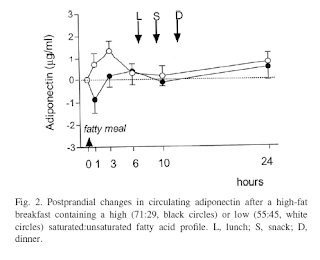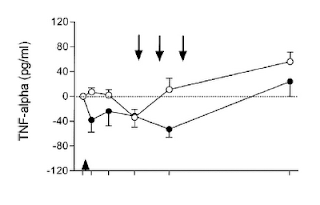Adiponectin is a hormone exclusively secreted by body fat. This hormone has been recently gaining attention from researchers because of some of its functions. Two important ones are the regulation of glucose and fat metabolism.
Elevated levels of adiponectin are associated with increased insulin sensitivity, and increased fat catabolism (i.e., fat burning). And these associations appear to be causal. That is, adiponectin levels do not seem to be only markers, but causes of increased insulin sensitivity and fat catabolism.
In other words, an increase in circulating adiponectin seems to lead to increased insulin sensitivity and increased fat catabolism. Insulin sensitivity is the opposite of insulin resistance. The latter is a precursor to diabetes type 2, and is associated with elevated fasting and postprandial (i.e., after a meal) glucose levels.
Adiponectin also seems to work closely with leptin, another hormone implicated in a number of diseases of civilization. It appears that adiponecting and leptin modulate each other’s secretion and effects in metabolic processes.
So what do we do to increase our levels of circulating adiponectin?
Well, apparently there is only one guaranteed way, and that is to lose body fat!
Adiponectin is unique among hormones secreted by body fat in that it increases as body fat decreases. Other important body fat hormones, such as leptin, decrease with body fat loss.
The figure below (from: Poppitt et al., 2008) shows a graph where adiponectin levels are plotted against body mass index (BMI). BMI is strongly correlated with body fat percentage.
As you can see from the figure above adiponectin levels more than double when BMI goes from 26 to 20. One does not need to be obese to take advantage of this effect, and to benefit from having increased adiponectin levels.
The linear (Pearson) correlation between BMI and adiponectin levels is indicated as a high 0.551. The fluctuations around the line (the "line" looks more like a quasi-linear curve obtained through quadratic regression), which are why the correlation is not 1, are probably due chiefly to two factors:
- BMI is not a very precise measure of body fat. A very muscular person will have a high BMI and low body fat. That person will consequently have much higher adiponectin levels than an obese person with equal BMI.
- Adiponectin levels are naturally higher in women than in men. This is another point in favor of adiponectin, as women have always been the evolutionary bottleneck among our Paleolithic ancestors.
Now you know why doctors prescribe weight loss to patients with diabetes type 2.
And, when we look at various hunter-gatherer groups that were apparently free of diseases of civilization prior to westernization, there are only a few common denominators. Diet was not one of them, as Weston Price and others have shown us, at least not in the sense of what they included in their diet.
One of the few common denominators was arguably the fact that those hunter-gatherers typically had relatively low levels of body fat; an almost universal feature among non-westernized hunter-gatherers.
Reference:
Poppitt, S.D. et al. (2008). Postprandial response of adiponectin, interleukin-6, tumor necrosis factor-α, and C-reactive protein to a high-fat dietary load. Nutrition, 24(4), 322-329.
Elevated levels of adiponectin are associated with increased insulin sensitivity, and increased fat catabolism (i.e., fat burning). And these associations appear to be causal. That is, adiponectin levels do not seem to be only markers, but causes of increased insulin sensitivity and fat catabolism.
In other words, an increase in circulating adiponectin seems to lead to increased insulin sensitivity and increased fat catabolism. Insulin sensitivity is the opposite of insulin resistance. The latter is a precursor to diabetes type 2, and is associated with elevated fasting and postprandial (i.e., after a meal) glucose levels.
Adiponectin also seems to work closely with leptin, another hormone implicated in a number of diseases of civilization. It appears that adiponecting and leptin modulate each other’s secretion and effects in metabolic processes.
So what do we do to increase our levels of circulating adiponectin?
Well, apparently there is only one guaranteed way, and that is to lose body fat!
Adiponectin is unique among hormones secreted by body fat in that it increases as body fat decreases. Other important body fat hormones, such as leptin, decrease with body fat loss.
The figure below (from: Poppitt et al., 2008) shows a graph where adiponectin levels are plotted against body mass index (BMI). BMI is strongly correlated with body fat percentage.
As you can see from the figure above adiponectin levels more than double when BMI goes from 26 to 20. One does not need to be obese to take advantage of this effect, and to benefit from having increased adiponectin levels.
The linear (Pearson) correlation between BMI and adiponectin levels is indicated as a high 0.551. The fluctuations around the line (the "line" looks more like a quasi-linear curve obtained through quadratic regression), which are why the correlation is not 1, are probably due chiefly to two factors:
- BMI is not a very precise measure of body fat. A very muscular person will have a high BMI and low body fat. That person will consequently have much higher adiponectin levels than an obese person with equal BMI.
- Adiponectin levels are naturally higher in women than in men. This is another point in favor of adiponectin, as women have always been the evolutionary bottleneck among our Paleolithic ancestors.
Now you know why doctors prescribe weight loss to patients with diabetes type 2.
And, when we look at various hunter-gatherer groups that were apparently free of diseases of civilization prior to westernization, there are only a few common denominators. Diet was not one of them, as Weston Price and others have shown us, at least not in the sense of what they included in their diet.
One of the few common denominators was arguably the fact that those hunter-gatherers typically had relatively low levels of body fat; an almost universal feature among non-westernized hunter-gatherers.
Reference:
Poppitt, S.D. et al. (2008). Postprandial response of adiponectin, interleukin-6, tumor necrosis factor-α, and C-reactive protein to a high-fat dietary load. Nutrition, 24(4), 322-329.


 :.
:.

 5:59 PM
5:59 PM
 Unknown
Unknown

































 ..
..










